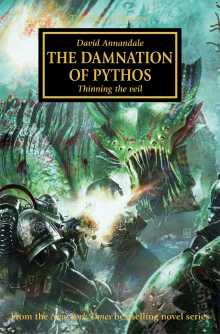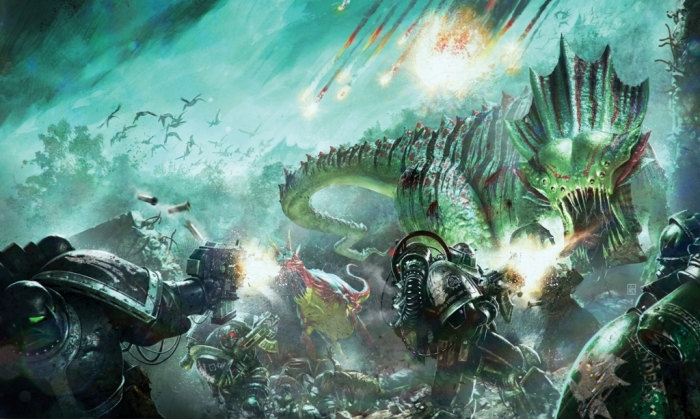In the aftermath of the Dropsite Massacre at Isstvan V, a battered and bloodied force of Iron Hands, Raven Guard and Salamanders regroups on a seemingly insignificant death world. Fending off attacks from all manner of monstrous creatures, the fractious allies find hope in the form of human refugees fleeing from the growing war, and cast adrift upon the tides of the warp. But even as the Space Marines carve out a sanctuary for them in the jungles of Pythos, a darkness gathers that threatens to consume them all…
The Damnation of Pythos is a different kind of Horus Heresy. Given Annandale’s past BL output, this should come as no surprise: it’s more atmospheric and horror-tinged than many other BL novels. As the synopsis states, this novel takes place shortly after the Isstvan V massacre, which saw the Iron Hands, Raven Guard and Salamanders take a real pounding from the guns and blades of the traitor legions. Unlike other recent Heresy titles, this one does not as obviously advance the story.* It is, nevertheless, an enjoyable read.
Annandale’s writing is atmospheric and evocative, and veers more towards the horror/baroque side of the WH40k aesthetic. At times, it is a little more florid than I would have liked, but this is quite common for BL releases – especially, strangely, in earlier chapters when we’re being situated and we’re being introduced to the characters. On the flip side, there are some excellent passages in the novel (even poetic, sometimes).
Speaking of the characters, Annandale’s not set himself an easy task: the Iron Hands believe the “flesh is weak” and, as a result, have a tendency to become ever-more cybernetic as time goes on. The Legion’s ethos includes subsuming their more-human traits (compassion, emotions, etc.). It was possible that these characters would have ended up being rather bland, or difficult to relate to. Thankfully, we also follow one of the Legion’s serfs and an Iron Hand who has retained more of his humanity than his comrades. Despite there general lack of emotion, the Legion is obviously struggling with the loss of their primarch, and how this tragedy has altered their character…
The transformation was more than simply physical. The spirit of its inhabitants had been altered. The people of Medusa were no strangers to hardship and death. Those were the perpetual facts of existence on that planet. But the coming of Ferrus Manus had been the dawn of something new for the clans of Medusa: hope. It was not a weakling’s hope that a better, easier future lay just over the horizon. It was hope that took the form of belief in the strength to carve out that future. The Iron Hands were the realisation of that hope. Their victories were triumphs, not just in the Emperor’s name, but for Medusa itself.
Now Manus was gone.
Their aversion to emotion cracks when they have the opportunity to mete out some vengeful punishment against the Emperor’s Children (some of the remnants go on a quick jaunt elsewhere to stage an ambush). They bicker and condescend to the handful of Salamander and Raven Guard survivors who have attached themselves to this force. They are, quite often, rather obnoxious.
There’s an interesting juxtaposition between the Iron Hands’ coldness and the savagery of Pythos, but also their shared qualities:
Galba thought about the difference between his home world and what he was rushing towards here. Life was violence on both planets. But on Medusa, life had to struggle simply to exist. Medusa was a world that rejected the organic. It was a test, and only the strongest forms found a purchase on its surface. Pythos, though, was monstrous in its all-encompassing welcome. Life had exploded here. Life piled on life. The only shortage was space, and that was enough to ignite a war of all against all.
Where the novel really shines (along with the aforementioned excellent passages) is in the pacing and slow, sinister unveiling of what’s really going on with Pythos. Annandale effectively utilises a number of popular horror tropes and tricks, bringing the Horus Heresy a bit more into the Aliens territory of horror-sci-fi. I welcomed this change from the normal style of Heresy novel. I can see a lot of readers and fans of more conventional HH novels being a little confused and/or disappointed with The Damnation of Pythos. I knew Annandale wouldn’t tread a conventional path and would offer something darker, and I wasn’t disappointed.
That was the power of the warp. It was everything the Imperium stood against, yet it was the precondition to the spread of the Emperor’s light. It was the impossible given a non-existent reality. It was the denial of place that was also the supreme means of travel. It seduced in order to destroy.
Other than the occasional more-florid language and description, I think this is a strong novel. True, it moved a little slowly at times; and the machinic, blank affect of some of the Iron Hands did make it tricky to engage with them all the way through. I hope Annandale writes more for the series – but I’d be lying if I said I wouldn’t prefer it to be more focused on advancing the overall story of the Heresy.
* The novel is the story of how the “Damnation Cache” is unleashed on the universe (adding another layer to the title, I suppose). In the author’s note at the end, this fact was presented as quite significant. As someone who hasn’t read much of the ‘official’ background outside of the novels, I didn’t know what this was. It’s very possible, therefore, that those more plugged in to the larger Heresy lore will appreciate the significance better than I did.
The Horus Heresy: Horus Rising, False Gods, Galaxy in Flames, Flight of the Eisenstein, Fulgrim, Descent of Angels, Legion, Battle for the Abyss, Mechanicum, Tales of Heresy, Fallen Angels, A Thousand Sons, Nemesis, The First Heretic, Prospero Burns, Age of Darkness, The Outcast Dead, Deliverance Lost, Know No Fear, The Primarchs, Fear to Tread, Shadows of Treachery, Angel Exterminatus, Betrayer, Mark of Calth, Promethean Sun, Scorched Earth, Vulkan Lives, Scars (I-III, IV-IX), The Unremembered Empire, Vengeful Spirit, The Damnation of Pythos, Legacy of Betrayal (forthcoming)


Really want to read this and Yarrick. That cover is awesome.
LikeLike
I’ve read all of the Yarrick short stories and they’ve been great (reviewers are up for them all, I think). Great stories about the character, one I’ve been familiar with since I first discovered WH40k – in fact, I think he may have been the first new character release when I first started reading White Dwarf. Him and Ragnar Blackmane. (For WH it was Nagash, which is why I’m really intrigued by the End Times novels…)
LikeLike
I was a bit sceptical when I started to read this novel. From the synopsis, I figured this would be just another incidental event of minor importance and it wouldn’t do much for the meta-plot of the Horus Heresy. In the end, it actually kinda confirmed my fears in that regard but I definitely agree with you on David Annandale’s writing. The way he handled the Iron Hands and how different they are compared to the Salamanders (the Raven Guard characters played even less of a role, I feel like) and how he portrayed the taint of Chaos in this novel were really interesting.
And I hadn’t thought of it as horror until you’ve mentioned it in the review, but you’re totally right. The way they are all kinda trapped on this planet, the behavior of those humans they saved who behave strangely and the psychological trauma the Iron Hands deal with… That’s all pretty much horror-stuff.
As for the Damnation-Cache… I would like to think myself as pretty versed in WH40k-lore but I had no idea what it was about either. Apparently it references a later event long after the Horus Heresy when Abbadon and his Black Legion attack that planet and the Damnation-Cache gets activated and plays a big role during that battle. So, it basically just sows the seeds for this Pandorax-Campaign.
LikeLike
[…] Earth, Vulkan Lives, Scars (I-III, IV-IX), The Unremembered Empire, Vengeful Spirit, The Damnation of Pythos, Legacies of Betrayal, Death & Defiance, Tallarn: Executioner, […]
LikeLike
[…] Earth, Vulkan Lives, Scars (I-III, IV-IX), The Unremembered Empire, Vengeful Spirit, The Damnation of Pythos, Legacies of Betrayal*, Death & Defiance*, Tallarn: Executioner, Deathfire, War Without End*, […]
LikeLike
[…] Lives (26), Scars (I-III, IV-IX; 27), The Unremembered Empire (28), Vengeful Spirit (29), The Damnation of Pythos (30), Legacies of Betrayal (31), Death & Defiance, Tallarn: Executioner, Blades of the […]
LikeLike
[…] Lives (26), Scars (I-III, IV-IX; 27), The Unremembered Empire (28), Vengeful Spirit (29), The Damnation of Pythos (30), Legacies of Betrayal (31), Death & Defiance, Tallarn: Executioner, Blades of the […]
LikeLike
[…] Lives (26), Scars (I-III, IV-IX; 27), The Unremembered Empire (28), Vengeful Spirit (29), The Damnation of Pythos (30), Legacies of Betrayal (31), Death & Defiance, Tallarn: Executioner, Blades of the […]
LikeLike
[…] Lives (26), Scars (I-III, IV-IX; 27), The Unremembered Empire (28), Vengeful Spirit (29), The Damnation of Pythos (30), Legacies of Betrayal (31), Death & Defiance, Tallarn: Executioner, Blades of the […]
LikeLike
[…] Sun, Vulkan Lives (26), Scars (27), The Unremembered Empire (28), Vengeful Spirit (29), The Damnation of Pythos (30), Legacies of Betrayal (31), Death & Defiance, Tallarn: Executioner, Blades of the Traitor, […]
LikeLike
[…] Sun, Vulkan Lives (26), Scars (27), The Unremembered Empire (28), Vengeful Spirit (29), The Damnation of Pythos (30), Legacies of Betrayal (31), Death & Defiance, Tallarn: Executioner, Blades of the Traitor, […]
LikeLike
[…] on CR: Interview with David Annandale (2012); Reviews of The Damnation of Pythos and Roboute […]
LikeLike
[…] Interview with David Annandale (2012); Guest Post on “My Favourite Novel”; Reviews of The Damnation of Pythos and Roboute […]
LikeLike
[…] Sun, Vulkan Lives (26), Scars (27), The Unremembered Empire (28), Vengeful Spirit (29), The Damnation of Pythos (30), Legacies of Betrayal (31), Death & Defiance, Tallarn: Executioner, Blades of the Traitor, […]
LikeLike
[…] Sun, Vulkan Lives (26), Scars (27), The Unremembered Empire (28), Vengeful Spirit (29), The Damnation of Pythos (30), Legacies of Betrayal (31), Death & Defiance, Tallarn: Executioner, Blades of the Traitor, […]
LikeLike
[…] Interview with David Annandale (2012); Guest Post on “My Favourite Novel”; Reviews of The Damnation of Pythos, […]
LikeLike
[…] on CR: Interview with David Annandale (2012); Reviews of Roboute Guilliman, The Damnation of Pythos, and […]
LikeLike
[…] Sun, Vulkan Lives (26), Scars (27), The Unremembered Empire (28), Vengeful Spirit (29), The Damnation of Pythos (30), Legacies of Betrayal (31), Death & Defiance, Tallarn: Executioner, Blades of the Traitor, […]
LikeLike